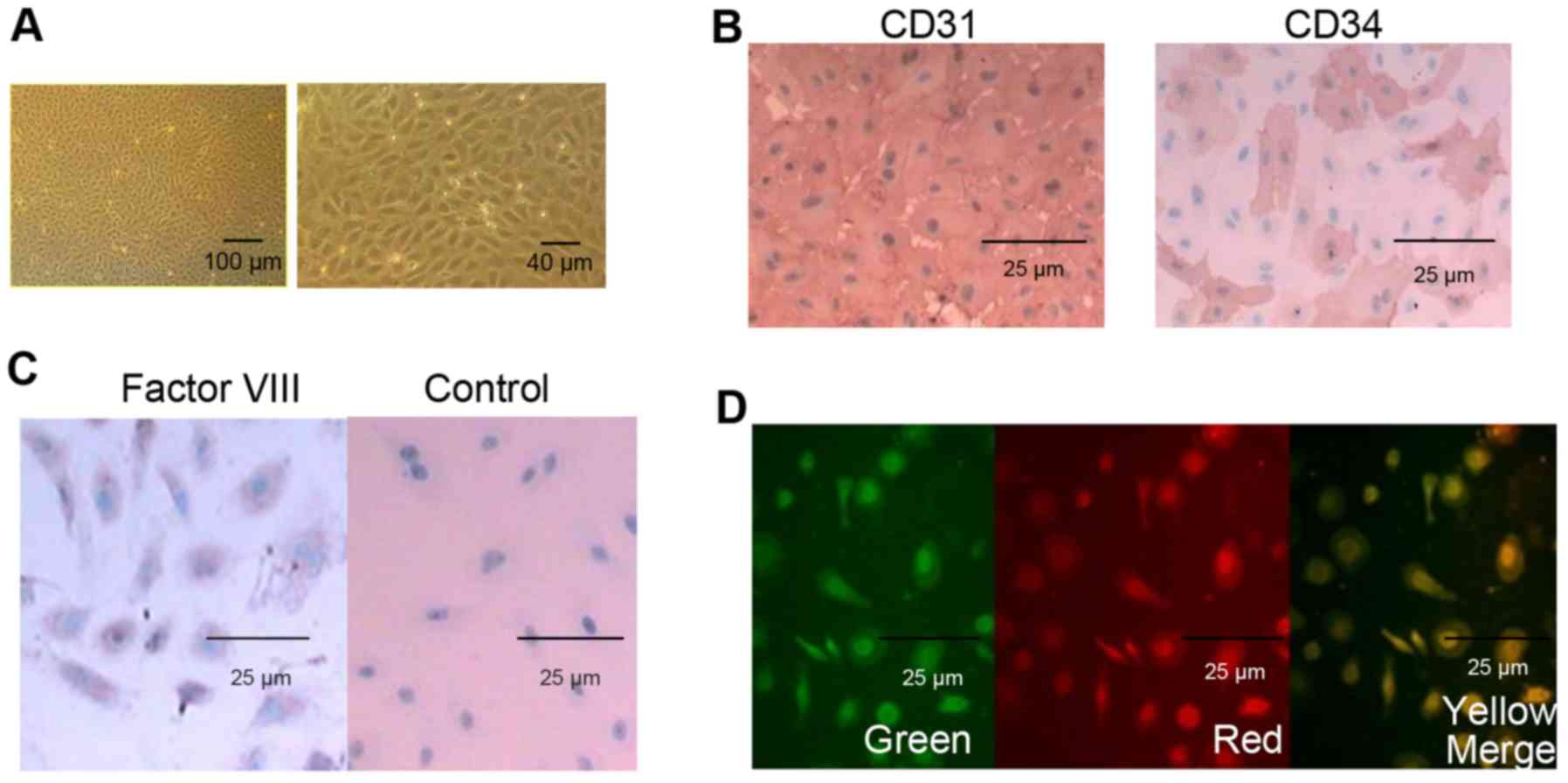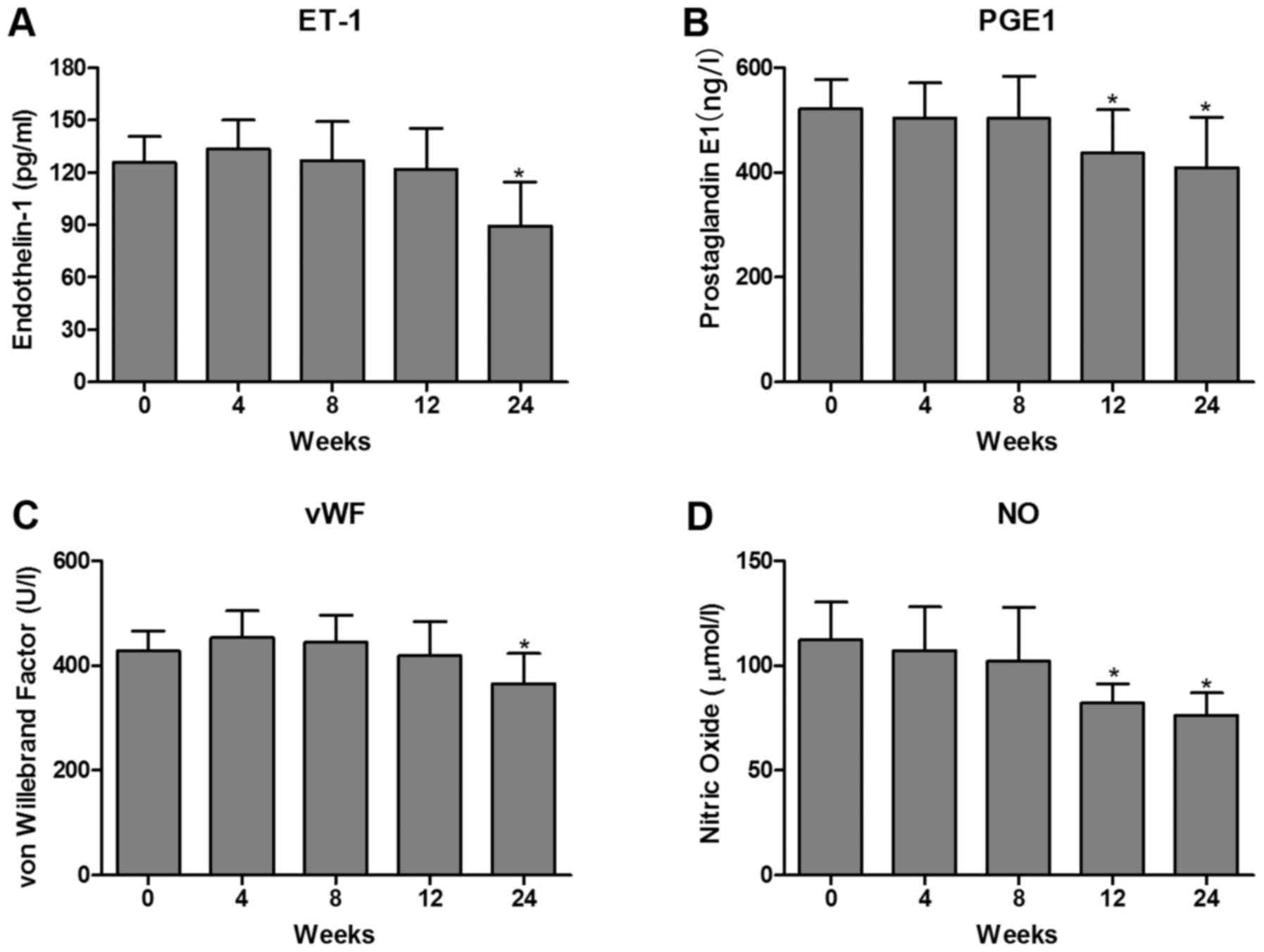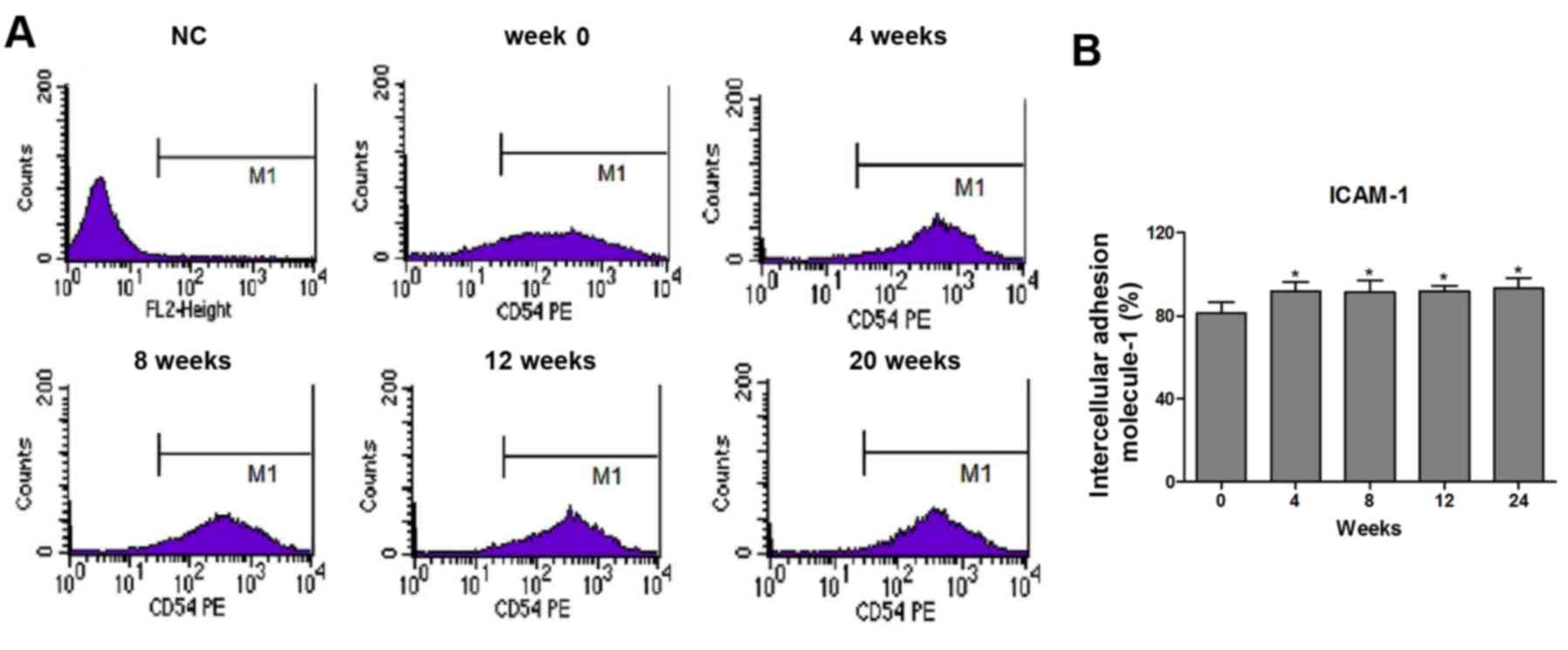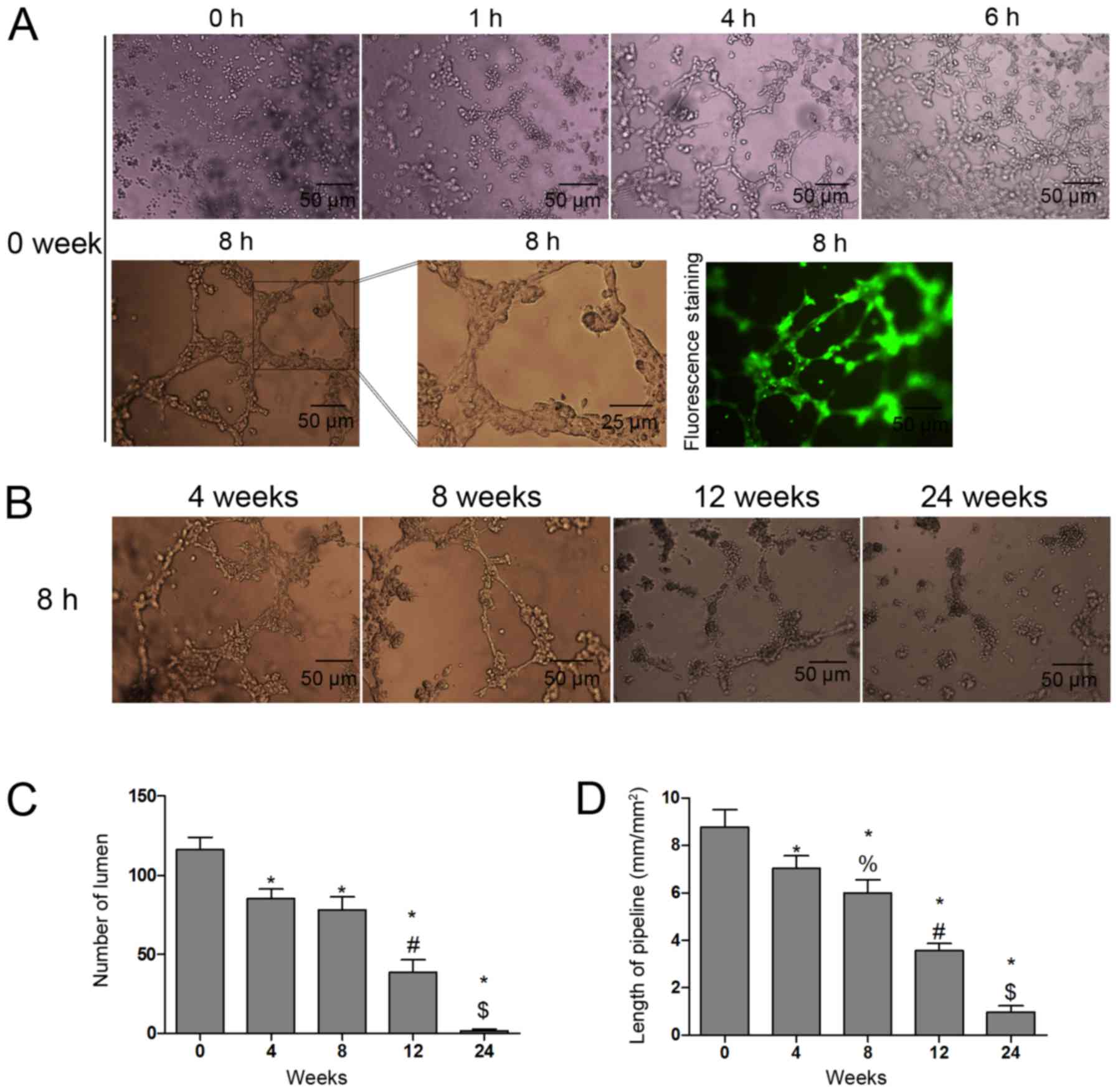|
1
|
Tabbaa SM, Horton CO, Jeray KJ and Burg
KJ: Role of vascularity for successful bone formation and repair.
Crit Rev Biomed Eng. 42:319–348. 2014. View Article : Google Scholar : PubMed/NCBI
|
|
2
|
Johnson EO, Troupis T and Soucacos PN:
Tissue-engineered vascularized bone grafts: Basic science and
clinical relevance to trauma and reconstructive microsurgery.
Microsurgery. 31:176–182. 2011. View Article : Google Scholar : PubMed/NCBI
|
|
3
|
Ishii M, Shibata R, Kondo K, Kambara T,
Shimizu Y, Tanigawa T, Bando YK, Nishimura M, Ouchi N and Murohara
T: Vildagliptin stimulates endothelial cell network formation and
ischemia-induced revascularization via an endothelial nitric-oxide
synthase-dependent mechanism. J Biol Chem. 289:27235–27245. 2014.
View Article : Google Scholar : PubMed/NCBI
|
|
4
|
Kadner A, Hoerstrup SP, Tracy J, Breymann
C, Maurus CF, Melnitchouk S, Kadner G, Zund G and Turina M: Human
umbilical cord cells: A new cell source for cardiovascular tissue
engineering. Ann Thorac Surg. 74:S1422–S1428. 2002. View Article : Google Scholar : PubMed/NCBI
|
|
5
|
Risbud MV, Karamuk E, Moser R and Mayer J:
Hydrogel-coated textile scaffolds as three-dimensional growth
support for human umbilical vein endothelial cells (HUVECs):
Possibilities as coculture system in liver tissue engineering. Cell
Transplant. 11:369–377. 2002.PubMed/NCBI
|
|
6
|
Lehle K, Hoenicka M, Jacobs VR, Schmid FX
and Birnbaum DE: Cryopreservation of human endothelial cells for
vascular tissue engineering. Cryobiology. 50:154–161. 2005.
View Article : Google Scholar : PubMed/NCBI
|
|
7
|
Bellón JM, Buján J, Honduvilla NG,
Hernando A and Navlet J: Behavior of cryopreserved endothelial
cells in different phases: Their application in the seeding of
vascular prostheses. Ann Vasc Surg. 9:266–273. 1995. View Article : Google Scholar : PubMed/NCBI
|
|
8
|
Bambang LS, Mazzucotelli JP, Moczar M,
Beaujean F and Loisance D: Effects of cryopreservation on the
proliferation and anticoagulant activity of human saphenous vein
endothelial cells. J Thorac Cardiovasc Surg. 110:998–1004. 1995.
View Article : Google Scholar : PubMed/NCBI
|
|
9
|
Pascual G, Escudero C, Rodriguez M,
Corrales C, Serrano N, Bellón JM and Buján J: Restoring the
endothelium of cryopreserved arterial grafts: Co-culture of venous
and arterial endothelial cells. Cryobiology. 49:272–285. 2004.
View Article : Google Scholar : PubMed/NCBI
|
|
10
|
Komori K, Inoguchi H, Kume M, Shoji T and
Furuyama T: Differences in endothelial function and morphologic
modulation between canine autogenous venous and arterial grafts:
Endothelium and intimal thickening. Surgery. 131:(1 Suppl).
S249–S255. 2002. View Article : Google Scholar : PubMed/NCBI
|
|
11
|
Jaffe EA, Nachman RL, Becker CG and Minick
CR: Culture of human endothelial cells derived from umbilical
veins. Identification by morphologic and immunologic criteria. J
Clin Invest. 52:2745–2756. 1973. View Article : Google Scholar : PubMed/NCBI
|
|
12
|
Nicoud IB, Clarke DM, Taber G, Stolowski
KM, Roberge SE, Song MK, Mathew AJ and Reems JA: Cryopreservation
of umbilical cord blood with a novel freezing solution that mimics
intracellular ionic composition. Transfusion. 52:2055–2062. 2012.
View Article : Google Scholar : PubMed/NCBI
|
|
13
|
Engler C, Kelliher C, Chang S, Meng H and
Jun AS: Cryopreservation and long-term culture of transformed
murine corneal endothelial cells. Graefes Arch Clin Exp Ophthalmol.
250:103–110. 2012. View Article : Google Scholar : PubMed/NCBI
|
|
14
|
Hu X, Jiang Z and Liu N: A novel approach
for harvesting lymphatic endothelial cells from human foreskin
dermis. Lymphat Res Biol. 4:191–198. 2006. View Article : Google Scholar : PubMed/NCBI
|
|
15
|
Wu Z, Hofman FM and Zlokovic BV: A simple
method for isolation and characterization of mouse brain
microvascular endothelial cells. J Neurosci Methods. 130:53–63.
2003. View Article : Google Scholar : PubMed/NCBI
|
|
16
|
Russell JS and Brown JM: Circulating mouse
Flk1+/c-Kit+/CD45- cells function as endothelial progenitors cells
(EPCs) and stimulate the growth of human tumor xenografts. Mol
Cancer. 13:1772014. View Article : Google Scholar : PubMed/NCBI
|
|
17
|
Wu J, Lu Z, Nie M, Zhou H, Sun X, Xue X,
Bi J and Fang G: Optimization of cryopreservation procedures for
porcine endothelial progenitor cells. J Biosci Bioeng. 113:117–123.
2012. View Article : Google Scholar : PubMed/NCBI
|
|
18
|
Lee CC, Chen PR, Lin S, Tsai SC, Wang BW,
Chen WW, Tsai CE and Shyu KG: Sesamin induces nitric oxide and
decreases endothelin-1 production in HUVECs: Possible implications
for its antihypertensive effect. J Hypertens. 22:2329–2338. 2004.
View Article : Google Scholar : PubMed/NCBI
|
|
19
|
Fang WT, Li HJ and Zhou LS: Protective
effects of prostaglandin E1 on human umbilical vein endothelial
cell injury induced by hydrogen peroxide. Acta Pharmacol Sin.
31:485–492. 2010. View Article : Google Scholar : PubMed/NCBI
|
|
20
|
Lip GY and Blann A: von Willebrand factor:
A marker of endothelial dysfunction in vascular disorders?
Cardiovasc Res. 34:255–265. 1997. View Article : Google Scholar : PubMed/NCBI
|
|
21
|
Meerschaert J and Furie MB: The adhesion
molecules used by monocytes for migration across endothelium
include CD11a/CD18, CD11b/CD18, and VLA-4 on monocytes and ICAM-1,
VCAM-1, and other ligands on endothelium. J Immunol. 154:4099–4112.
1995.PubMed/NCBI
|
|
22
|
Jiang Z, Hu X, Kretlow JD and Liu N:
Harvesting and cryopreservation of lymphatic endothelial cells for
lymphatic tissue engineering. Cryobiology. 60:177–183. 2010.
View Article : Google Scholar : PubMed/NCBI
|
|
23
|
Pegg DE: Cryopreservation of vascular
endothelial cells as isolated cells and as monolayers. Cryobiology.
44:46–53. 2002. View Article : Google Scholar : PubMed/NCBI
|
|
24
|
Campbell LH and Brockbank KG: Culturing
with trehalose produces viable endothelial cells after
cryopreservation. Cryobiology. 64:240–244. 2012. View Article : Google Scholar : PubMed/NCBI
|
|
25
|
Hope SA and Meredith IT: Cellular adhesion
molecules and cardiovascular disease. Part I. Their expression and
role in atherogenesis. Intern Med J. 33:380–386. 2003. View Article : Google Scholar : PubMed/NCBI
|
|
26
|
Duan M, Yao H, Hu G, Chen X, Lund AK and
Buch S: HIV Tat induces expression of ICAM-1 in HUVECs:
Implications for miR-221/−222 in HIV-associated cardiomyopathy.
PLoS One. 8:e601702013. View Article : Google Scholar : PubMed/NCBI
|
|
27
|
Krieglstein CF and Granger DN: Adhesion
molecules and their role in vascular disease. Am J Hypertens.
14:44S–54S. 2001. View Article : Google Scholar : PubMed/NCBI
|
|
28
|
Richards M, Fong CY, Tan S, Chan WK and
Bongso A: An efficient and safe xeno-free cryopreservation method
for the storage of human embryonic stem cells. Stem Cells.
22:779–789. 2004. View Article : Google Scholar : PubMed/NCBI
|


















